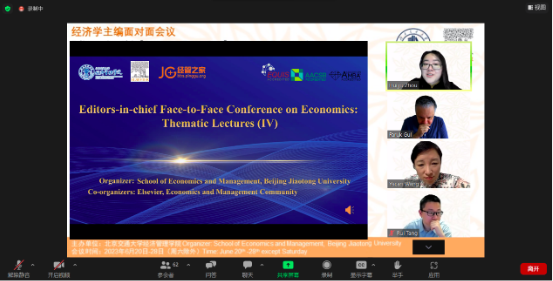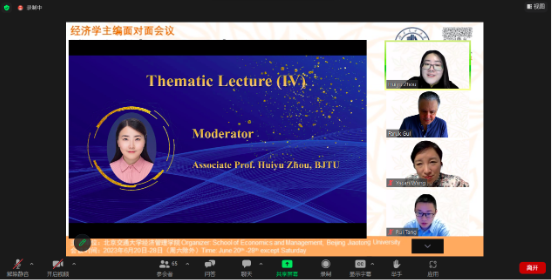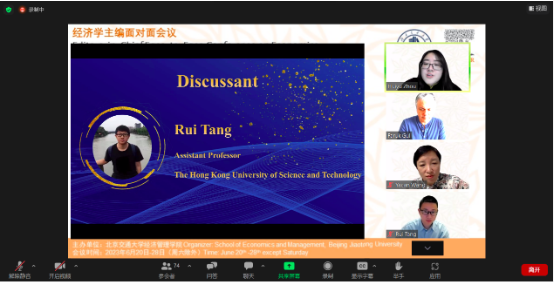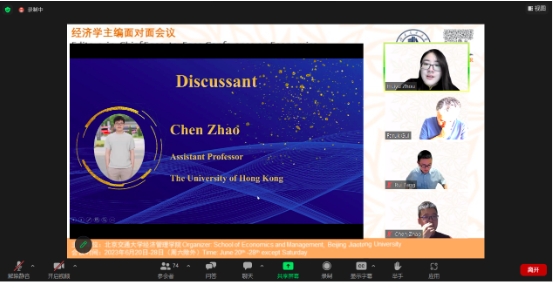2023 Economic Editor-in-Chief Meeting: Editor in Chief Lecture Series (4): Lecture Successfully Held by the Editor in Chief of Journal of Economic Theory, Top Journal of Theoretical Economics
Faruk Gul, the Editor in Chief of the Journal of Economic Theory and an economics professor at Princeton University, presented an online academic lecture titled "Lorenz Expected Utility Theory" on June 25, 2023, from 20:00 to 22:00 Beijing time. This lecture marked the fourth session of the second module of the 2023 face-to-face meeting of economics chief editors, known as "The Chief Editors' Series of Thematic Lectures." The event was hosted by the School of Economics and Management at Beijing Jiaotong University, co-organized by Elsevier Group and the Forum of Economic Management House. The special lecture took place in the form of a ZOOM online conference, with simultaneous broadcasts on two major platforms: Elsevier Video accounts and service accounts, as well as Management Home live streaming. The hosting responsibilities were undertaken by Associate Professor Zhou Huiyu from the School of Economics and Management at Beijing Jiao Tong University, and Assistant Professor Tang Rui from the University of Science and Technology of Hong Kong and Assistant Professor Zhao Chen from the University of Hong Kong were invited as guest reviewers. The total number of attendees exceeded 8564, including 81 from the Zoom conference room, 6635 from Elsevier, and 1848 from Management Home.

Opening of Special Lecture by the Editor in Chief of Journal of Economic Theory, Top Journal of Theoretical Economics

Led by Associate Professor Zhou Huiyu from the School of Economics and Management at Beijing Jiaotong University
Faruk Gul, the Editor in Chief of the Journal of Economic Theory and a professor of economics at Princeton University, is recognized for his expertise in decision theory, game theory, and competitive equilibrium theory. With a substantial contribution to the field, he has authored over 100 papers published in reputable economic journals such as the Journal of Economic Theory and Econometrica, accumulating more than 7200 citations and achieving an H-index of 32. Professor Faruk Gul has held significant editorial roles, serving as the deputy editor in chief for seven journals, including the Journal of Economic Theory, Econometrica, International Journal of Game Theory, Economic Design, European Journal of Political Economy, Games and Economic Behavior, and Theoretical Economics. Additionally, he has served as the joint editor in chief for two journals, namely Theoretical Economics and Journal of Economic Theory. At present, Professor Faruk Gul holds the position of editor in chief for the Journal of Economic Theory.
In his lecture, Professor Faruk Gul delved into his recent research on "Lorenz Expected Utility Theory." Collaborating with his research partners, they developed a framework to characterize all non-expected utility functions based on the cardinal utility index. Their primary assumption, the Preference Mixture Certainty Independence hypothesis, acts as a benchmark for the Certainty Independence hypothesis in a pure risk environment. The model explored specific cases such as level-dependent expected utility, disappointment aversion, and Maxmin expected utility theory, all solely based on probability. The research introduced the Lorentz utility expression with two parameters (u, δ). The cardinal utility index, u, gauges how expected utility changes with wealth, while parameter δ reflects the deviation of expected utility. They extended Sheshinski's 1972 welfare function using the Lorentz utility expression. Sheshinski's function subtracts the Gini coefficient from 1 and multiplies it by per capita GDP. In contrast, Professor Faruk Gul and his collaborators' welfare function multiplies the parameters of the Lorentz curve δ by expected utility, where u measures prior income risk, and δ measures the cost of post-inequality. Professor Faruk Gul's research unveils distinctive features of non-expected utility preferences, showcasing that level-dependent expected utility preferences and disappointment aversion preferences are subsets of Maxmin-type non-expected utility preferences.

Professor Faruk Gul shares the latest research findings
Assistant Professor Tang Rui from the Hong Kong University of Science and Technology and Assistant Professor Zhao Chen from the University of Hong Kong provided insightful comments on Professor Faruk Gul's lecture. Assistant Professor Tang Rui emphasized the significance of the research, noting that Professor Gul and his collaborators introduced a novel preference model based on the Preference Mixture Certainty Independence axiom. This model is unique in using the cardinal utility index to describe non-expected utility. He highlighted the study's generalization of the level-dependent expected utility model, the Maxmin non-expected utility model, and Sheshinski's 1972 welfare function. During the discussion with Professor Faruk Gul, Assistant Professor Tang Rui explored potential avenues for future research, specifically addressing which aspects of decision-making require further examination and the circumstances under which the combination of theory and experiment would be most meaningful.

Highlights of Assistant Professor Tang Rui from Hong Kong University of Science and Technology
Assistant Professor Zhao Chen provided detailed commentary on the Lorentz utility representation and mathematical constraints in the study. He delved into questions such as whether non-expected utility always has a V (Fu) type representation, the existence quantifier in axioms, and the mapping and representation parameters from a to b in the mixed deterministic independent hypothesis of preference δ. Additionally, he discussed the relationship between them and the preference for mixed deterministic independence benchmarking under Anscombe-Aumann settings. During the discussion with Professor Faruk Gul, these mathematical intricacies and representations were thoroughly explored. Professor Faruk Gul graciously responded to the comments and suggestions, expressing gratitude to the reviewers and engaging in further discussions on potential avenues for future research.

Outstanding comments by Assistant Professor Zhao Chen of the University of Hong Kong
It seems like Professor Faruk Gul's lecture on "Lorentz Expected Utility Theory" was intellectually stimulating, providing a comprehensive exploration of non-expected utility functions through cardinal utility indices. The lecture appears to have guided the audience through complex concepts, prompting thoughtful consideration and generating fresh insights. The participation of Assistant Professors Tang Rui and Zhao Chen added depth to the discussion, summarizing key points and suggesting avenues for further research. The Q&A session fostered an engaging exchange of ideas, contributing to the overall success of this special lecture. It's impressive to see how these academic sessions are fostering knowledge-sharing and pushing the boundaries of theoretical economics in China.











